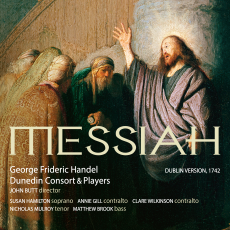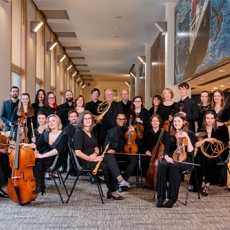Handel's Messiah - Dunedin Consort - SA-CD.net
This recording is as different from Handel: Messiah - Jacobs as chalk is from cheese in the approach of the respective music directors but one thing is constant - the highest level of musicianship.
There are some crucial differences of edition between the two recordings. Jacobs presents the familiar edition of the Messiah (dating from around 1750) whereas John Butt directs the "original" version, with the same texts, choral and solo numbers, orchestration (although he admits that his ideas of size of ensemble and choir are educated guesses) and use of soloists as the Dublin première of 1742. For those that are worried about missing the differences, which I shall set out below, from the usual version - fear not, for they are provided as appendices at the end of each disc. On disc 1, a recitative (of dubious authenticity) that possibly pre-dated the now more usual aria "But Who may abide" is the supplementary feature; on disc 2, the more usual recitative and aria versionof "He that dwelleth in Heaven shall laugh them to scorn" & "Thou shalt break them with a rod of iron" is given to allow the listener to choose whether should be heard or the purely recitative original.
The main textual differences are that:
1) The Air "How beautiful are the feet of them: that preach the gospel of peace, and bring glad tidings of good things." (Romans 10 : 15) and the following chorus is replaced by a duet for two altos and chorus to the words of Isaiah 52:7-9 ("How beautiful are the feet of him that bringeth glad tidings of salvation that saith unto Sion, thy God reigneth! Break forth into joy! Glad tidings thy God reigneth!")
2) The orchestral forces used here are reduced to only strings, 2 trumpets, timpani, harpsichord and organ. Most other conductors, including Jacobs, also employ 2 oboes, a bassoon and an expanded continuo ensemble.
3) The size of the strings is smaller than many (4.3.2.2.1 here compared to Jacobs' 6.5.3.3.2), as is the chorus (3.3.3.3 here instead of 11.7.7.7 for Jacobs).
Other minor changes that might surprise an unsuspecting ear are that the Airs:
1) "But who may abide" is sung by a bass not an alto (or counter-tenor for Jacobs)
2) "Thou art gone up" is sung by a bass not an alto (or counter-tenor for Jacobs)
3) "If God be for us" is sung by a contralto rather than the usual soprano (or counter-tenor for Jacobs)
As already mentioned, the performances are absolutely first rate, with no weak links anywhere, vocally or instrumentally. The fundamental difference in the performing style adopted by Butt compared to Jacobs is that this set is more traditional in the religious approach to the work. I do not mean to suggest that they treat the score as a sacred text that must be piously conveyed but that they do not seem to pretend that it is another opera (just with a religious story) in the manner that Jacobs is wont to adopt. The result is a freshness that few, if any, ensembles have managed to bring to the score. This is fundamentally helped by the smaller than usual size of the orchestra and chorus but in the more famous choruses, there is no shortage of weight thanks to the excellent long-term balancing of Butt. Tempi must be counted as near an ideal as one could ever hope to hear and all the phrasing decisions are to the support of the musical argument not its detriment. It would be invidious to single out any of the vocal soloists or instrumentalists as they are all so good but for clarity the vocal soloists are:
Susan Hamilton (soprano), Annie Gill (Contralto), Clare Wilkinson (Contralto), Nicholas Mulroy (Tenor) and Matthew Brook (Bass)
The recording is of the same high standard of the interpretation. The clarity is vividly portrayed and it is startlingly easy to locate each section of the orchestra and chorus, even in the densest moments of the score. The soloists are also well positioned - neither too prominent nor reticent. Bravo Linn - we should look forward to Bach's St Matthew Passion from the same forces that was recorded in September 2007 in the same acoustic - the clearly wonderful Greyfriars Kirk in Edinburgh.
Highly recommended - indeed, this version is probably the first choice for this ever popular work.

